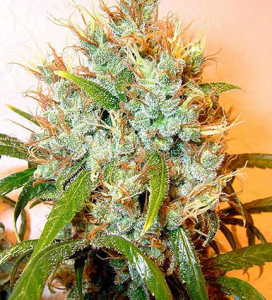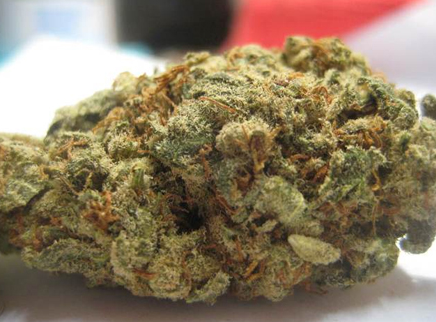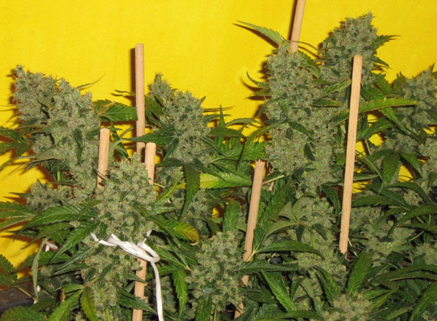
Kali Mist was developed in the early 1990s, when many primo sativas from mysterious origins were gathered and selectively bred. Kali has had a series of fathers, creating slight differences based on time period. Seeds first sold under this name strongly resembled the typical Southeast Asian sativa, but an interim father in the 1990s gave the offspring a more Afghani look. With the new millennium, Kali’s third father has returned it to a strongly sativa appearance.
Kali plants grow to a medium height with long internodes and medium-long fan leaves. The plant’s structure is “open”, meaning it’s possible to see all the way through the sapce between the plants. This structure promotes good quality buds along the entire length of the stem because light can penetrate through the entire plant. Big individual flowers cluster closely together to form buds that are mostly leafless in 75 percent of the plants. The other quarter form a more traditional bud with many leaflets. On both types, glandular trichomes abound.
Seedlings are ready to flower after 30-40 days of vegetative growth, when they should be clipped to avoid undainly heights. Clones are ready for flowering as soon as they are rooted, about 3-4 dyas. Indoor growing is recommended, by any method, including sea of green. Kali can be attempted outside where long growing seasons prevail.
With a sweet scent and flavor that spans both the sweet and spicy, this variety offers a cerebral high that leaves the mind clear and focused. Kali Mist’s effects have proven beneficial for medical users with multiple sclerosis, fatigue, and chronic pain. A popular choice among women, Kali Mist is a great all-day pot that can enhance energetic outdoor activities or more meditative, thoughtful pastimes.
1st place, High Times Cannabis Cup hydro division 1995.
1st place, High Times Cannabis Cup sativa category 2000.
Ever smoke or grow Kali Mist? Tell us about it in a comment below!



